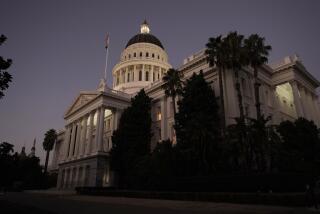Senate Breaks Logjam, Passes Key Farm Bills
- Share via
WASHINGTON — Breaking a five-day logjam, the Senate on Wednesday night approved legislation aimed at correcting politically embarrassing “mistakes” in the 1985 farm bill that threatened to lower incomes for many farmers, including California vegetable growers.
Also included in the package was a controversial provision that would soften the impact of Gramm-Rudman spending cuts on dairy farmers.
The legislation, sponsored by Sen. Robert J. Dole (R-Kan.), also is infused with election-year politics. Many legislators are worried that some minor but hastily approved provisions in the new farm law could seriously affect the pocketbooks of their farmer constituents. In a year when the GOP’s ability to retain its 53-47 Senate majority could hang on the reelection of seven farm-state Republicans, both parties are anxious to correct any such mistakes.
Approval of the bill by voice vote cleared the way for immediate passage of another measure, an emergency $5-billion appropriation for the Commodity Credit Corp., which had run out of money needed for sending crop-subsidy checks to thousands of farmers. That measure was also approved by voice vote.
The House is expected to take up both pieces of legislation today, but there may be strong resistance from urban liberals upset about allowing dairy farmers to escape heavy cuts under the new Gramm-Rudman deficit reduction law. The urban members argue that dairy farmers should not be given special treatment when other programs assisting the poor and elderly are taking it on the chin.
Sens. Tom Harkin (D-Iowa) and John Melcher (D-Mont.) had held up action on the Senate bills since Friday, insisting that an amendment be added to give debt-ridden grain farmers access to $3 billion in low-interest planting loans.
The logjam was broken when the two Midwestern Democrats agreed to a proposal by Dole, the Senate majority leader, that the matter be addressed in a non-binding, “sense-of-the-Senate” resolution. The resolution, approved by 65 to 18, urged the Reagan Administration to consider advancing farmers 7.75% crop loans now instead of waiting until harvest time.
President Reagan has adamantly opposed such a move, but Harkin argued that thousands of farmers are faced with bankruptcy unless they can get planting loans at less than the going commercial rates, which range up to 14%.
‘Mistakes’ in 1985 Bill
The legislation that would correct newly perceived deficiencies--or so-called mistakes--in the 1985 farm bill involves staving off income losses for subsidized corn and wheat farmers as well as for unsubsidized vegetable growers.
One provision would change the farm bill’s formula for calculating the amount of income subsidies that a farmer would be eligible to receive. Another provision would repeal a section in the farm bill that allowed grain and corn farmers to continue receiving crop subsidies even if they switched some of their acreage to vegetables.
Growers of unsubsidized California broccoli, Idaho potatoes and Michigan navy beans, among others, protested that their markets would be glutted, and prices thereby depressed, by the new competition.
A third provision would help dairy farmers who face a 4.3% cut in milk price supports demanded by the first round of Gramm-Rudman spending cuts, which took effect last Saturday.
To soften that blow, the new bill would replace the price support cut of 55 cents per 100 pounds of milk products with an increase in the assessment, or tax, that is imposed on dairy farmers to pay for various surplus-reduction programs. Dairy state legislators said an assessment would spread the Gramm-Rudman blow more widely and less deeply.
More to Read
Get the L.A. Times Politics newsletter
Deeply reported insights into legislation, politics and policy from Sacramento, Washington and beyond. In your inbox twice per week.
You may occasionally receive promotional content from the Los Angeles Times.










